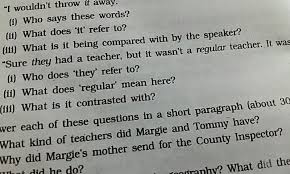12.12.23Classic Clips: Eric Snider “Establishes Meaning” in The Giver

“Word-Level Questions” such as those assessing understanding for pronoun reference are powerful
We’re getting ready to lead a two day workshop on Reading Reconsidered in Raleigh, NC on January 18 and 19 (details here). As part of the preparation we were going over some older reading footage and we found this gem from Eric Snider. It’s a short clip and if you watched it you could be forgiven for not at first noticing all of the things that are so outstanding about it.
The first thing we love about the clip is how intentional Eric is about establishing meaning before he analyzes meaning.
Here’s the passage they are reading. It’s a sequence of short, apparently simple sentences from Chapter 11 of the Giver:
Climate Control. Snow made growing food difficult, limited the agricultural periods. And unpredictable weather made transportation almost impossible at times. It wasn’t a practical thing, so it became obsolete when we went to Sameness.
So often teachers will race to the bigger questions–What does the policy of Sameness reveal about the community?–without first making sure students have understood what they’ve read. But Eric wants to make sure. The passage describes, in muted language and via a bit of passive voice, the decision to alter the natural world and eliminate snow because it is inconvenient. But to understand that, you have to track the pronoun reference for “it” back to “snow.” They are far apart with lots of confusing potential referents appearing in between. It’s a classic example of the curse of expertise. Things that are difficult for novices are invisible to experts because of their own skill. As an English teacher, it’s so easy to not see that students might struggle to even understand this reference.
So Eric tests. He circles ‘it.’ He asks: What does the word “it” refer to in this paragraph? He sees the hesitance in the raised hands… the limited numbers of volunteers. He senses their hesitance. “Ok. Could you draw an arrow from it to the word it refers to?”
This is a brilliant move. Everyone has to try to answer. And he can circulate and glance at papers to see the full data set very quickly. They don’t really know.
Now he knows to go back and re-read. Re-reading aloud is a great move here. When his students read he can gather even more data on how well they can follow the passage. The student who reads reveals that he has failed to read agricultural and obsolete accurately. There’s no sense analyzing meaning until we have established meaning and clarity on that breaks down a LOT more than most teachers realize. So Eric gets points for checking and points for fixing. And at the end we can see him beginning to ask more analytical questions.
As a side note, we also love two things about his response to the student who reads the passage aloud. First, that he’s so appreciative and supportive but he also corrects his student. Every chance we get to ask students to read aloud is a win as it builds fluency skills and delivers data on their reading, but it only works if students feel confident and safe. Eric’s response models how teachers can make that happen perfectly. Second, we love that Eric uses a few of our favorite ‘implicit vocabulary’ moves.
Briefly, we know that while teaching vocabulary words directly and explicitly is important, most of the words students learn they will learn by encountering them in their reading, and so teachers also need to employ actions that reinforce vocabulary implicitly. The goal is to increase students’ attentiveness to words they aren’t familiar with and/or have not mapped orthographically. Simply having them repeat the word as a group assists with that latter process and, by helping to ensure that students know how to pronounce it, helps to ensure that they will read it and not skip it when they next see it in their reading. His quick ‘drop it in’ definition also helps students benefit more from this short interaction with the word. Implicit vocabulary moves always try to increase attentiveness to and value from exposure to new words encountered while reading for other purposes while managing the transaction cost of doing so in order to not disrupt other lesson goals. Eric does that perfectly. In fact, here’s an instant replay of that moment.
We’ll discuss those two topics: implicit vocabulary and establishing meaning while reading at our workshop in Raleigh. We hope you can join us.